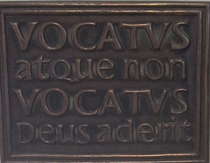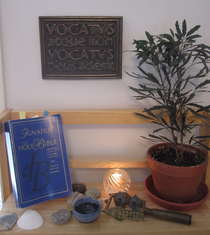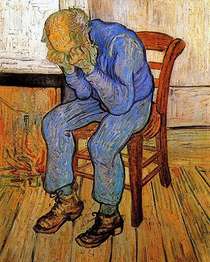 Pierre Teilhard de Chardin May 1, 1881-April 10, 1955
Pierre Teilhard de Chardin May 1, 1881-April 10, 1955
 This morning, the beginning of a day off work, I walked into my office, lit two candles while singing the old hymn, “Come Holy Ghost,” and sat facing the small collection of sacramentals surrounding the Bible. Having long neglected the practice of Lectio Divina and quiet prayer, I came again to, if nothing else, rest in the presence of God. The plaque above the bookcase reminded me that on the days I do not do this God is no less present to me. (Called or not called, God is present.)
This morning, the beginning of a day off work, I walked into my office, lit two candles while singing the old hymn, “Come Holy Ghost,” and sat facing the small collection of sacramentals surrounding the Bible. Having long neglected the practice of Lectio Divina and quiet prayer, I came again to, if nothing else, rest in the presence of God. The plaque above the bookcase reminded me that on the days I do not do this God is no less present to me. (Called or not called, God is present.)
I take comfort in that, not only for myself, but for all humanity, for all creation. Holy Presence animates all and in some way draws all to Unity. I believe that, though I confess ignorance of its workings.
Praying morning prayer, I discovered that today is the fifty-seventh anniversary of Pierre Teilhard de Chardin’s death in New York city, 1955. An priest and theologian, he was also a renowned scientist in the fields of paleontology and geology. In the late sixties, I began to read his collection of essay’s and prayers, “Hymn of the Universe.” Joining his faith and science, Teilhard wrote about evolution in its latter stages as a conscious choice, a choice of community and love, a choice that will lead all creation to union with the Love.
I have not read Teilhard de Chardin for a long time. Today, I took out some of my books and looked over them, finding what spoke most strongly to me by looking for underlined passages and notes in the margins. His seeing of all things as “sacred,” as the earth and human society as “home,” as the place to transform as we work out salvation not for ourselves alone, but for all, these insights speak to me still.
These two quotes were favorites:
“Nothing here below is profane for those who know how to see it.”
The day will come when, after harnessing space, the winds, the tides, and
gravitation, we shall harness for God the energies of love. And on that day, for
the second time in the history of the world, we shall have discovered fire. (“The
Evolution of Chastity,” in Toward the Future, 1936, XI, 86-87)
Today, I am drawn to another. To one that calls to us in a sorely divided nation and world. One that calls for vision. For choosing to see….
Seeing. One could say that the whole of life lies in seeing if not ultimately, at
least essentially. To be more is to be more united and this sums up and is the
very conclusion of the work to follow. But unity grows, and we will affirm this
again, only if it is supported by an increase of consciousness, of vision. That is
probably why the history of the living world can be reduced to the elaboration of
ever more perfect eyes at the heart of a cosmos where it is always possible to
discern more. Are not the perfection of an animal and the supremacy of the
thinking being measured by the penetration and power of synthesis of their
glance? To try to see more and to see better is not, therefore, just a fantasy,
curiosity, or a luxury. See or perish. This is the situation imposed on every
element of the universe by the mysterious gift of existence. And thus, to a higher
degree, this is the human condition. (Pierre Teilhard de Chardin: The Human
Phenomenon, trans. Sarah Appleton-Weber, p. 3)
The Easter mystery of Jesus’ death and resurrection, if believed, compels us to participate in transforming the world, not for personal salvation, but for the final realization of union of all in the Community of Love, Who is our God. Our participation is possible because the Spirit, the creative Presence dwells in each of us, as Jesus promised. It it that power that enables us to choose “to see” as Teilhard says. Continued spiritual evolution must be chosen.
 As Telihard says, we must “See or perish.” We must see Christ in one another. We must seek unity and solidarity, not division and discord. We must stand with those who are marginalized and remember that we move forward together or not at all.
As Telihard says, we must “See or perish.” We must see Christ in one another. We must seek unity and solidarity, not division and discord. We must stand with those who are marginalized and remember that we move forward together or not at all.
Which brings me back to my simple efforts this morning to renew the practice of quiet prayer and pondering the Word in Scripture. Sometimes I must be still to recognize the Easter Presence and respond to it. I must clear my head to see the Risen Christ in the world around me and to embrace the journey of all as my own.

 PHOTO: Mary van Balen
PHOTO: Mary van Balen 
 “Sorrow” by Auguste Rodin 1881-1882 Reading
“Sorrow” by Auguste Rodin 1881-1882 Reading  Again the news surfaces during Holy Week, when Good Friday offers theGood Friday offers an opportunity for the Church to admit wrongdoing, repent, and ask for forgiveness, as all Christians are encouraged to do. Will this Good Friday pass as it did two years ago without church hierarchy taking advantage of it? I imagine so. Until it is grasped, and Church leadership is honest with itself and with the world, its credibility is lost and more faithful will find other communities to join for worship and Christian life.
Again the news surfaces during Holy Week, when Good Friday offers theGood Friday offers an opportunity for the Church to admit wrongdoing, repent, and ask for forgiveness, as all Christians are encouraged to do. Will this Good Friday pass as it did two years ago without church hierarchy taking advantage of it? I imagine so. Until it is grasped, and Church leadership is honest with itself and with the world, its credibility is lost and more faithful will find other communities to join for worship and Christian life.  PHOTO: Mary van Balen I slipped into the pew a little late and noticed the lovely palm branches. Some people held them in their hands, some had laid them on the seat behind them. A few secured them with the hat clips on the pew backs, relics of days when hats were ordinary attire for men. They were not the long slender palm buds that my father had woven into crosses or interesting cone shapes when I was a child. These were the dark green leaves of the Emerald Palm and this was first time I had seen them.
PHOTO: Mary van Balen I slipped into the pew a little late and noticed the lovely palm branches. Some people held them in their hands, some had laid them on the seat behind them. A few secured them with the hat clips on the pew backs, relics of days when hats were ordinary attire for men. They were not the long slender palm buds that my father had woven into crosses or interesting cone shapes when I was a child. These were the dark green leaves of the Emerald Palm and this was first time I had seen them. PHOTO: Mary van Balen “This morning the green fists of the peonies are getting ready/to break my heart/ as the sun rises,/ as the sun strokes them with his old, buttery fingers/ and they open— / pools of lace,/white and pink…”
PHOTO: Mary van Balen “This morning the green fists of the peonies are getting ready/to break my heart/ as the sun rises,/ as the sun strokes them with his old, buttery fingers/ and they open— / pools of lace,/white and pink…” London School of Economics crest Yesterday I walked a couple of blocks to the local parish’s Lenten fish fry. My sister had recommended it saying the fish was good and the people friendly. My refrigerator was empty and enjoying at least one Lenten fish fry sounded like a good idea.
London School of Economics crest Yesterday I walked a couple of blocks to the local parish’s Lenten fish fry. My sister had recommended it saying the fish was good and the people friendly. My refrigerator was empty and enjoying at least one Lenten fish fry sounded like a good idea. PHOTO: Syria Under Government Crackdown, Elizabeth Arrott public domain Seek the Lord while he is still to be found, call to him while he is still near. Let the wicked man abandon his way, the evil man his thoughts. Let him turn back to the Lord who will take pity on him, to our God who is rich in forgiving.
PHOTO: Syria Under Government Crackdown, Elizabeth Arrott public domain Seek the Lord while he is still to be found, call to him while he is still near. Let the wicked man abandon his way, the evil man his thoughts. Let him turn back to the Lord who will take pity on him, to our God who is rich in forgiving.
 PHOTO: Elizabeth van Balen Delphia – Bean Creek Funny how a piece of mail that arrived late could be just on time. Two weeks after the beginning of Lent, a one-page reflection on a program for the season appeared in my mailbox. Sent from the Benedictine Abbey in North Dakota,
PHOTO: Elizabeth van Balen Delphia – Bean Creek Funny how a piece of mail that arrived late could be just on time. Two weeks after the beginning of Lent, a one-page reflection on a program for the season appeared in my mailbox. Sent from the Benedictine Abbey in North Dakota,